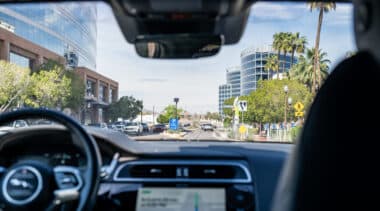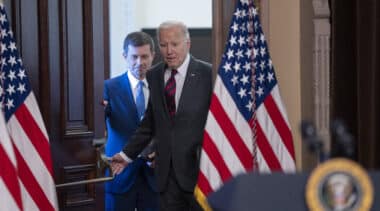Marc Scribner is a Senior Transportation Policy Analyst at Reason Foundation.
Scribner's work focuses on a variety of public policy issues related to transportation, land use, and urban growth, including infrastructure investment and operations, transportation safety and security, risk and regulation, privatization and public finance, urban redevelopment and property rights, and emerging transportation technologies such as automated road vehicles and unmanned aircraft systems. He frequently advises policymakers on these matters at the federal, state, and local levels.
Scribner has testified numerous times before Congress at the invitation of both Democrats and Republicans on issues including highway revenue collection, traffic congestion management, public transit productivity, freight rail regulation, airport financing, and air traffic control modernization. He is a member of the Transportation Research Board’s Standing Committee on Emerging Technology Law.
He has appeared on television and radio programs in outlets such as Fox Business Network, National Public Radio, and the Canadian Broadcasting Corporation, and has also written for numerous publications, including USA Today, The Washington Post, Wired, CNN.com, MSNBC.com, Forbes, and National Review. And his work has been featured by The Wall Street Journal, New York Times, Washington Post, Los Angeles Times, Scientific American, Congressional Quarterly, Washington Monthly, POLITICO, CNN, Bloomberg, BBC, C-SPAN, and other print, television, and radio outlets.
Scribner joined Reason Foundation after more than a decade at the Competitive Enterprise Institute, where he was a senior fellow in transportation policy. He received his undergraduate degree in economics and philosophy from George Washington University.
-
The App Store Accountability Act would undermine privacy and parental choice
The App Store Accountability Act would make age restrictions online more invasive than in any other area of daily life.
-
Comments to the U.S. Department of Transportation on ensuring lawful regulation
This public comment letter was submitted to the U.S. Department of Transportation’s Office of the Secretary on May 5, 2025.
-
Nevada Senate Bill 395 could hinder autonomous vehicle progress
Automated vehicle technology could greatly improve road safety and efficiency. Senate Bill 395 would move Nevada in the wrong direction.
-
Montana’s proposed regulatory framework for autonomous vehicles needs reform
Montana’s Senate Bill 67 attempts to provide a regulatory framework for autonomous vehicles, but the proposal conflicts with best practices learned in other states.
-
Montana Senate Bill 67 would stall automated vehicle progress
Montana needs a workable regulatory framework for vehicles equipped with automated driving systems. However, Senate Bill 67 has several problems.
-
Addressing the transit productivity crisis
Public transit ridership is unlikely to recover to pre-pandemic levels within the next decade.
-
Delaware Senate Bill 46 would ban autonomous vehicles
Automated vehicle technology under development could greatly improve road safety and efficiency.
-
Tennessee Senate Bill 310 would prohibit driverless vehicles
Automated vehicle technology could greatly improve road safety and efficiency.
-
STB should reject Amtrak’s claim to absolute preference over freight rail
Adopting Amtrak’s dubious absolute preference standard runs counter to the public interest by violating principles of Congress’s transportation policy.
-
Midnight regulations pursued by the Biden administration’s Department of Transportation
The Fall 2024 Unified Agenda lists 222 active rulemaking projects at the U.S. Department of Transportation.
-
Modernizing air traffic control infrastructure requires institutional modernization
Institutional problems are undermining efforts to modernize infrastructure needed to support continued air traffic volume growth in the National Airspace System.
-
Policy discussions around rail safety regulation should consider the role of standards
Any proposed safety regulation should address an identified market failure and avoid short-circuiting the continual evolution of safety-enhancing technologies, standards, and operating practices.
-
Massachusetts Question 3 would authorize a union and collective bargaining for ride-hail drivers
The new labor framework would be overseen by state regulators, who would approve agreements between the parties.
-
Regulatory agenda may offer glimpse into a potential Harris administration’s transportation automation policy
It's possible Vice President Kamala Harris' close ties to Silicon Valley could lead her potential administration to adopt a more positive and forward-looking view on transportation automation.
-
Mandatory reciprocal switching won’t enhance transportation competition
Mandatory reciprocal switching “will lead to decreased network velocity, diminished capital investments into the freight rail network, and deteriorating rail intermodal service levels.”
-
Revenue, ridership, and post-pandemic lessons in public transit
The consensus in the transportation research community is nationwide transit ridership is unlikely to recover its pre-pandemic ridership levels in the next decade.
-
Takeaways from the NTSB’s final report on the East Palestine derailment
The agency’s findings suggest that a major legislative response from Congress is not needed to advance rail safety.
-
Congress must address the transit productivity crisis
Public transit ridership in the United States fell during the COVID-19 pandemic and, as of the first quarter of 2024, has only recovered 76.2% of its 2019 riders.


















